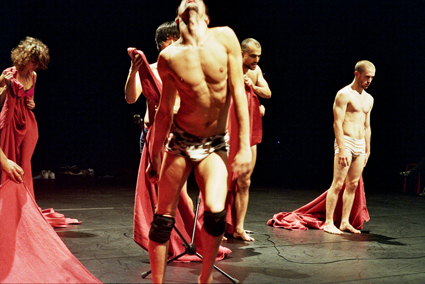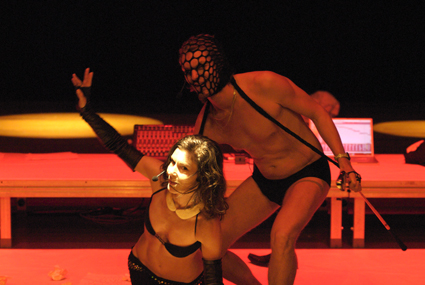the pre-cognitive alternative
jana perkovic: needcompany; les ballets c de la b

Out of Context—For Pina, Les Ballets C de la B
photo Chris Van der Burght
Out of Context—For Pina, Les Ballets C de la B
IT IS PERHAPS IRONIC, AND PERHAPS TRAGIC, 20 YEARS INTO A POST-IDEOLOGICAL ERA, IN WHICH CHOICE-LED CONSUMERISM HAS REMAINED THE SOLE SURVIVING ETHOS, THAT ART IS INCREASINGLY PREOCCUPIED WITH THE QUESTION OF THE STANDARDISATION OF HUMAN EXPERIENCE. WHAT SHOULD HAVE DISAPPEARED WITH THE SOVIET UNION SEEMS, ON THE CONTRARY, ALL-PERVASIVE.
From architect Rem Koolhaas’ notion of the “generic city” to theorist Fredric Jameson’s understanding of how postmodernity empties time of causal progression, analysis across disciplines returns to the idea that all this variation of screen sizes and skirt lengths is just a buzzing distraction from the standardisation of life on all levels, from feelings to social interaction, psychology to geography, to which There Is No Alternative.
Nothing exemplifies this buzzing vacuum better than the flying circus of internationally touring theatre, in which winning formulae and fashionable styles are often tediously replicated across languages and bodies, and all apparent cultural diversity collapses into trendy homogeneity. One such flying circus, Needcompany, is currently touring Europe with a production that interrogates precisely what happens to the human soul in this generic society.
The Ballad of Ricky and Ronny, a collaboration with Anna Sophia Bonnema and Hans Petter Dahl, is the first in a planned trilogy of pop-operas about a disaffected middle-class couple. It is sung entirely in international English, the thin, bland second language of most of the contemporary world, combining the tinniness of Nico and the verbal rhythms of Patti Smith with the drowsy beats of Flaming Lips. Ricky and Ronny once experienced love, idealism, the 1960s. Now, they cannot put a finger on the cause of their despair, as they lack any serious grievance. Instead, they milk their bloodless English, collected from Hollywood movies and pop music, for tired invectives and sentimental clichés. They try to muster stage provocation with bondage-wear and sexual experimentation. And yet they linger on stage in impeccable Euro-clothes, studiously avoiding physical contact, while their unnameable despair coalesces into a phantasm child, an hallucination made out of pink snow and yellow sperm, and they eventually commit a meaningless suicide. To underline just how little pathos The Ballad intends to create, an immaculate French maid sits upstage right throughout the performance, leisurely fiddling with the tech.
The opera is a structural, Zizekian tragedy: Ricky and Ronny are defeated by monster consumerism which satisfies desires before they can even fully form, leaving them in a state of voiceless agitation, or what cultural commentator Mark Fisher would call “depressive hedonia.” Thematically, the work sits in the conventional territory of dramatising cocooning middle-class despair without a cause. Its memory of love that used to redeem draws unlikely associations with Sarah Kane, whose despair is also moored in the deepest belief in love. However, Ricky and Ronny’s anxiety has no shelter throughout the performance, as the work refuses to believe in the metaphorical monsters its protagonists build to outsource their existential angst, much less defeat them in order to bring about any happy ending.

The Ballad of Ricky and Ronny, Needcompany
photo Maarten Vanden Abeele
The Ballad of Ricky and Ronny, Needcompany
The problems are threefold: eliminating the poetic aspects in the figuration of the bourgeois ennui does not, by itself, reveal its socio-political structure; The Ballad is no more penetrating a social critique than a conventional zombie flick. Secondly, made entirely out of generic elements, it is one of the most tedious performances I have ever seen, so commonplace through and through that it tends towards invisibility. Finally, there is an annoying solipsism at the heart of a performance that so deeply represents and replicates the very condition it denounces: it appears to have frustrated every Eastern European audience it has encountered, including the one that saw it with me at Eurokaz festival in Croatia. While it must be said that the immaculate staging and the direction of movement build the formal perfection of the piece, I have rarely been so pleased to see an audience rebel against understanding an artwork. For it means that tragic standardisation is not a universal condition, despite all the global English employed to construct the argument.
A new work by another Belgian company, Les Ballets C de la B’s Out of Context—For Pina, approaches the matter from a radically different angle. Alain Platel’s company is among Europe’s most respected, and the new work was showing at Sadler’s Wells for only two nights before rushing back to the festival circuit (it was scheduled at Avignon later in the season). The UK critics were rather sceptical towards a company that meshes vernacular movement with high aspirations (‘fun’ and ‘skill,’ two terms dear to British dance, are quietly sidelined in Platel’s vocabulary), but Out of Context has, in other places, been hailed as their best work yet.
The movement, woven out of the unconscious tics, spasms, hysterical and involuntary gestures that Platel has encountered in his prior work as an orthopedagogue includes pouting, scratching, over-the-top disco dancing, parodic mime and is consciously poor in style, making almost no references to any ‘serious’ dance tradition. Platel has refused to call himself a choreographer; Out of Context is an exquisite choreography nonetheless. Unlike his previous works, it is played on an empty stage, to no programmatic score. Bookmarked by nine dancers entering from the stalls, undressing to their underwear, then dressing and leaving again at the end of the show, it has three clear phases: initial rituals of mating and acquainting with animal sounds in the background evolves into the second phase, in which lines of pop music are thrown around together with exuberant dancing until, in the elegiac third part, the dancers retreat into singularity again. The piece defies description by virtue of sheer over-accumulation: 90 minutes of startlingly original movement with virtually no repetition, on nine different physiques that, even when amassed into synchronicity, preserve individual differences. (The piece is dedicated to Pina Bausch, in recognition of the foundational importance of her psychologically driven strategies for European dance.) Not having any narrative frame allows the audience to experience this decontextualised mass of movement on the level of affect, not cognition, free-associating stage images to deep memories. The result is emotionally penetrating and deliriously enjoyable.
Whereas The Ballad of Ricky and Ronny is a work so deeply illustrative of the nihilistic element within consumer capitalism that it irons itself into a completely inexpressive pancake, Out of Context locks itself within the last bastion of human expression that has escaped the Fordism of soul: the pre-cognitive, the involuntary, the spastic. We could see an eternal, unwinnable race at work, in which ever-shrinking chunks of life are accessed, broken down, conquered and reproduced—perhaps Platel is simply mapping previously inaccessible sides of the human experience. But it is also good, in some fundamental way, to experience a performance that leaves the audience elated rather than crushed.
Needcompany/MaisonDahlBonnema, The Ballad of Ricky and Ronny, authors, performers Anna Sophia Bonnema, Hans Petter Dahl, libretto Bonnema, music Dahl, costume, lighting MaisonDahlBonnema; Eurokaz Festival, Zagreb, June 23-24; Out of Context—For Pina, Les Ballets C de la B, concept, direction Alain Platel, dramaturgy Hildegard De Vuyst, danced & created by Elie Tass, Emile Josse, Hyo Seung Ye, Kaori Ito, Mathieu Desseigne Pavel, Melanie Lomoff, Romeu Runa, Rosalba Torres Guerrero, Ross McCormack; Sadler’s Wells, London, June 17,18
RealTime issue #98 Aug-Sept 2010 pg. 25






